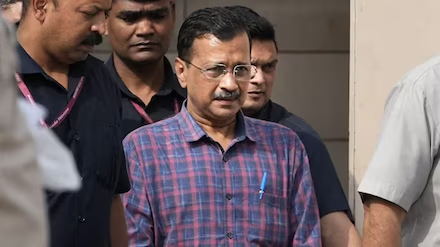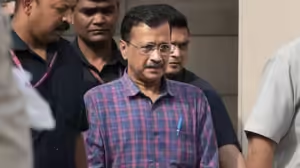

Supreme Court Grants Bail To Arvind Kejriwal
The Supreme Court granted bail to Delhi Chief Minister Arvind Kejriwal on September 13, 2024, in connection with the ongoing investigation into the alleged Delhi liquor policy scam. This decision marks a significant development for the Aam Aadmi Party (AAP) leader, who had been in custody since June 26, 2024.
Key Highlights of the Bail Decision
- Bail Granted: The Supreme Court’s decision allows Kejriwal to be released on a bail bond of ₹10 lakh, along with two sureties. The court also instructed him not to make any public comments regarding the merits of the case.
- Background of the Case: Kejriwal was arrested as part of a broader investigation into alleged corruption related to the Delhi government’s liquor excise policy, which was implemented in November 2021 and later withdrawn. The Central Bureau of Investigation (CBI) and the Enforcement Directorate (ED) are investigating claims of money laundering and bribery linked to this policy.
- Legal Proceedings: The Supreme Court had reserved its verdict on two petitions filed by Kejriwal on September 5, challenging both the denial of bail and the legality of his arrest by the CBI. The court highlighted the prolonged nature of Kejriwal’s incarceration, noting that multiple chargesheets had been filed since the FIR was registered in August 2022.
- Judicial Opinions: The bench of Justices Surya Kant and Ujjal Bhuyan expressed differing views on the validity of Kejriwal’s arrest. Justice Kant stated that the CBI did not violate procedural laws during the arrest, while Justice Bhuyan raised concerns about the timing and necessity of the arrest, suggesting it could have been influenced by political factors.
- Political Implications: The AAP hailed the bail decision as a “victory of truth” and criticized the central government for allegedly using investigative agencies to target opposition leaders. With Kejriwal’s release, the party is expected to refocus its efforts on upcoming elections, particularly in Haryana.

How did the Supreme Court justify granting bail to Kejriwal ?
The Supreme Court granted bail to Delhi Chief Minister Arvind Kejriwal in the Delhi liquor policy case, citing several key reasons:
Prolonged Incarceration
The Bench, comprising Justices Surya Kant and Ujjal Bhuyan, noted that Kejriwal had suffered prolonged incarceration, with four chargesheets filed since the FIR was registered on August 17, 2022. They highlighted that the completion of trial may not occur in the near future, emphasizing that “prolonged incarceration in jail is a problem for liberty.”
Bail is the Rule, Jail is the Exception
The Supreme Court reiterated the principle that “bail is the rule, jail is the exception,” which was laid down in a 1977 judgment by Justice Krishna Iyer. The court has consistently upheld this principle in recent cases, including those involving stringent laws like the Prevention of Money Laundering Act (PMLA)
Arrest Procedure Followed
While the Bench was split on the validity of Kejriwal’s arrest, Justice Surya Kant opined that the CBI did not violate Section 41A(3) of the Criminal Procedure Code in arresting the CM. He stated that there is no impediment in arresting a person already in judicial custody.
Kejriwal Not a Flight Risk
Kejriwal’s legal team, led by senior advocate Abhishek Manu Singhvi, argued that the CM being “a constitutional functionary, cannot be a flight risk.” They also claimed that there is no risk of tampering with the evidence, which is documentary in nature and has already been collected by the CBI.
Bail Granted to Other Accused
The court noted that almost all the other accused in both the CBI and ED cases, including Manish Sisodia and K Kavitha, had already been granted bail. This likely influenced the decision to extend the same relief to Kejriwal. By granting bail to Kejriwal, the Supreme Court upheld the principles of personal liberty and the presumption of innocence, while also considering the prolonged incarceration and the bail granted to co-accused in the case.

How did the CBI and ED justify their arguments against Kejriwal’s bail ?
The Central Bureau of Investigation (CBI) and the Enforcement Directorate (ED) presented several arguments against granting bail to Delhi Chief Minister Arvind Kejriwal in the ongoing liquor policy case. Here are the key points from their justification:
Arguments Against Bail
- Tampering with Evidence: The CBI contended that if released on bail, Kejriwal might tamper with evidence and disrupt the ongoing investigation. They expressed concerns that his release could hinder the probe into the alleged irregularities associated with the Delhi excise policy.
- Potential Influence on Witnesses: The CBI argued that Kejriwal’s release could lead to witness intimidation or influence, as they believed he held a significant position that could affect the testimonies of individuals involved in the case. This concern was echoed by the Delhi High Court, which noted that witnesses had only come forward after his arrest, suggesting that his presence outside could deter them from testifying.
- Role Differentiation: The CBI maintained that Kejriwal’s role in the alleged corruption was not on par with that of his co-accused, asserting that he played a more significant part in the formulation and execution of the controversial liquor policy. Thus, they argued, he should not be granted bail merely because others had received it.
- Legal Process Compliance: The CBI pointed out that Kejriwal had bypassed the usual legal process by directly approaching the High Court for bail instead of first seeking it from the trial court. They argued that this was not the standard procedure and indicated an attempt to secure “special treatment”.
- Public Sentiment and Judicial Integrity: The CBI expressed that granting bail to Kejriwal could demoralize the lower courts and undermine public confidence in the judicial process. They argued that the integrity of the judicial system should be upheld, especially in high-profile cases involving public figures.
- Sufficient Evidence: The CBI emphasized that a substantial amount of evidence had been gathered against Kejriwal, primarily from testimonies of approvers—former accused who have been pardoned in exchange for cooperating with the investigation. They argued that this evidence warranted his continued detention.
These arguments were part of the CBI’s broader strategy to oppose Kejriwal’s bail, reflecting their concerns about the potential implications of his release on the ongoing investigation and the judicial process.

Conclusion
Discover more from
Subscribe to get the latest posts sent to your email.






